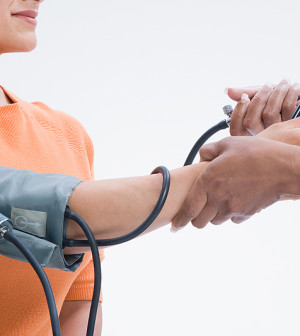- 8 Ways to Increase Dopamine Naturally
- 7 Best Breads for Maintaining Stable Blood Sugar
- Gelatin vs. Collagen: Which is Best for Skin, Nails, and Joints?
- The Long-Term Effects of Daily Turmeric Supplements on Liver Health
- Could Your Grocery Store Meat Be Causing Recurring UTIs?
- Are You Making This Expensive Thermostat Error This Winter?
- Recognizing the Signs of Hypothyroidism
- 10 Strategies to Overcome Insomnia
- Could Artificial Sweeteners Be Aging the Brain Faster?
- Techniques for Soothing Your Nervous System
Blood Pressure Meds May Raise Risk of Serious Falls for Seniors


Seniors who take drugs to lower their blood pressure may be more likely to fall and end up with a broken hip or head injury, Yale University researchers report.
Side effects of blood pressure medications include dizziness and problems with balance, the study authors noted. Older adults taking these drugs were 30 percent to 40 percent more likely to suffer a serious injury following a fall than those who did not take these drugs. The risk was more than double among those who had suffered a similar injury previously, the researchers added.
Given the higher risks for illness and death after serious falls, “the potential harms versus benefits of blood pressure medications should be weighed in deciding how aggressively to treat high blood pressure in older adults,” said lead researcher Dr. Mary Tinetti, a professor of medicine and public health at Yale.
Death and loss of function associated with serious falls are akin to strokes and heart attacks — the very events blood pressure medications are designed to prevent, she added.
The report was published online Feb. 24 in the journal JAMA Internal Medicine.
Dr. Sarah Berry, an instructor in medicine at Harvard Medical School and co-author of an accompanying journal editorial, pointed out that “there does not appear to be one class of blood pressure drugs that are safer than others.”
So, Berry added, “When treating an elderly patient with high blood pressure, it makes sense to use the lowest dose possible to achieve the target blood pressure.”
However, another expert wasn’t convinced by the findings.
“With respect to the association between blood pressure medication use and falls, I believe at this point it is inconclusive,” said Dr. Adam Skolnick, an assistant professor at the Leon H. Charney Division of Cardiology at NYU Langone Medical Center in New York City. “The authors cannot entirely exclude the possibility that high blood pressure itself, and not necessarily its treatment, is associated with falls.”
For the study, Tinetti and her colleagues collected data on almost 5,000 people older than 70 with high blood pressure. In all, 14 percent didn’t take drugs to control their blood pressure, nearly 55 percent took some medications and 31 percent took several blood pressure-lowering drugs.
During three years of follow-up, 446 patients (9 percent) suffered serious injuries from falls. The risk for these injuries was higher among people taking blood pressure medication than people not taking any such drugs. Moreover, the risk was higher among those who had a serious injury from a fall before, the researchers found.
While the study found an association between using blood pressure medications and serious falls among seniors, it did not prove a cause-and-effect link.
Another expert thinks the risk of high blood pressure and the risk of injury from falls need to be considered in context of overall health.
“High blood pressure is a leading risk factor for heart attack, stroke, heart failure and kidney disease in older adults, and use of blood pressure medications has been shown to substantially lower the risk of cardiovascular and stroke events as well as [all causes of death],” said Dr. Gregg Fonarow, associate chief of the division of cardiology at the University of California, Los Angeles, David Geffen School of Medicine.
However, use of blood pressure medications has been associated with increased risk of falls in a number of studies, he noted.
“While patients and clinicians should be aware of the increased risk of falls with use of blood pressure medications, if they closely monitor blood pressure sitting and standing, and take precautions to avoid falls, the proven cardiovascular benefits of these drugs substantially outweigh the potential risk of falls,” Fonarow said.
More information
For more information on high blood pressure, visit the U.S. National Library of Medicine.
Source: HealthDay
Copyright © 2026 HealthDay. All rights reserved.










